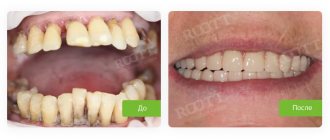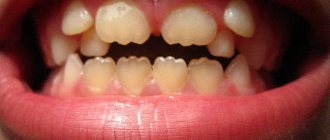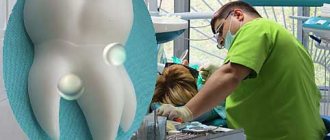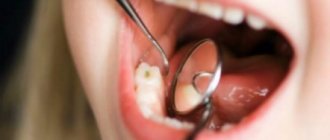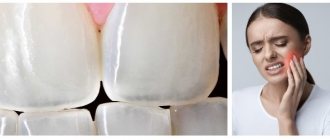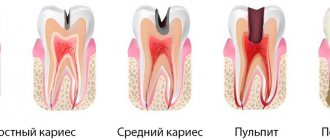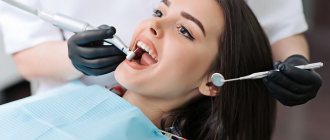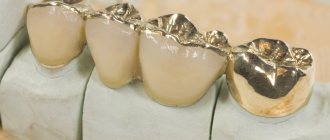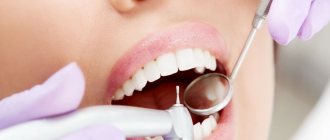Publication date: 10/20/2020
Modern solutions offered by clinics allow an individual approach to each patient and selection of the optimal method of restoring teeth in case of their destruction or absence. Prosthetics allows you to restore the aesthetics of the dentition and natural chewing functions, while prolonged absence of teeth always leads to serious health consequences - it affects the bite, jaw joints, and facial appearance. Therefore, it is so important to undergo prosthetics as soon as possible and enjoy the result. But what if instead of “pleasure” you get pain after dental prosthetics?
When is pain after prosthetics normal?
The causes of pain can be different. First of all, we will reassure those who have pain after prosthetics literally on the same day or not the next day that the prosthesis, be it a crown or a bridge, was installed. In 99.9% of cases, this is a normal situation that does not promise anything bad. The anesthesia (if it was used) has stopped working, you are gradually getting used to the new prosthesis, adaptation is required. Discomfort and even a semblance of pain in such conditions is normal. But you still need to carefully monitor your feelings – and consult a specialist if:
- The pain does not go away within 7-10 days
- The pain effect increases
- The pain changes character - from aching it turns into throbbing, it occurs under certain conditions, for example, as a reaction to hot food, or worsens at night when a person takes a horizontal position.
Indications and contraindications for dental care immediately after the procedure
The most important stage in post-prosthetic care is the first days after the installation of temporary and permanent crowns. Basic recommendations from dentists for this period:
- Do not eat for 2-3 hours after the procedure;
- Avoid eating sticky, viscous, hard foods;
- In the first days, if possible, do not load the crown - do not use it for chewing, chew on the other side of the jaw;
- Avoid excessively hot or cold foods.
All of the listed points are recommendations, and you can find out an individual list of indications from your dentist at the clinic.
Causes of tooth pain under a crown or denture
- If you have not had root canal treatment to remove the pulp before getting a crown, pressure on the damaged nerve may cause pain.
- Patients with malocclusion and bruxism may experience pain at night from pressing on ridges or areas of the tooth that are higher than normal.
- If the denture has shifted, exposing part of the tooth, or, worse, is pressing on the dental nerve, then the slightest pressure or change in temperature can send strong pain signals.
- Teeth under a crown are also at risk for all the problems associated with regular teeth, meaning they can become infected, break, and become vulnerable if the enamel wears down. And this can cause pain.
Allergies from dentures - myth or reality?
Prosthetics are an excellent chance to restore lost teeth or correct aesthetic defects. There are contraindications for installing crowns and dentures. These include allergic reactions of the patient to the dental material used.
Denture allergies are not a myth. The problem is urgent and becoming quite global; a generation is growing with a reduced or incorrect, atopic response of the human immune system.
Allergic reactions very often occur to artificial crowns that are in the mouth. They mainly react to products made of metal, metal-ceramics, or more precisely, to one of the components of the alloy.
What to do if a tooth hurts under a denture?
If toothache occurs after dentures, the first priority is to identify the cause as soon as possible and apply appropriate therapeutic measures. This problem will not resolve on its own, and any home remedies will not be effective. Therefore, do not wait and contact your dentist for professional help.
If the dentist discovers a tooth infection under the crown, he or she may recommend root canal treatment, which usually requires removal of the denture. In some cases, a hole can be drilled into the crown, allowing the dentist to access the root canal without having to remove and install another crown. This is a complex operation, but it will save you money since the removed crowns are often no longer reusable.
Which components are allergens?
In the manufacture of metal and metal-ceramic prostheses, nickel-chromium or cobalt-chromium alloy and copper are used. The first option causes allergic reactions more often than others.
There is a burning sensation in the oral cavity, redness of the gums around the crowns, and swelling of the soft tissues may occur. Because of this inflammation, when chewing and chewing food, the gums begin to hurt and bleed. A metallic taste in the mouth and a tingling sensation should alert a person and force him to see a doctor at the clinic.
This type of metal dental structures is inexpensive and therefore popular.
Allergic reactions to removable dentures are possible, specifically to the plastic and acrylic from which the structure is made. In addition to the material itself, the composition with which the prosthesis is painted can be an allergen. The dye used to make removable dentures pink is more likely to cause a reaction. There is a burning sensation in the mouth and swelling of the gums on which the prosthesis is located.
Prevention of pain after dental prosthetics
As with all dental procedures, the simplest and cheapest solution is to prevent the problem from occurring in the first place.
- If you have dental crowns or bridges, you should have a dental checkup at least once every 6 months. The dentist will monitor the condition of the teeth under the dentures, since they are initially at risk.
- Hardware cleaning of bacterial plaque and possible food debris will prevent the development of infections and caries; this procedure is mandatory along with normal home oral hygiene, including brushing teeth and using dental floss.
- It is also important to monitor the integrity of the dentures - avoid hard foods and excessive loads so that the denture is not damaged or its tight fit to the stump of the supporting tooth is broken.
Don’t endure pain after dentures - contact the orthopedists at the ILATAN family dentistry closest to your home to get advice and help. Registration is available by phone +7 (495) 748-50-50.
How to identify complications after installation of a prosthesis?
If there are doubts about the normal state of the mucous membrane under the prosthesis, you need to pay attention to several specific manifestations.
Swelling of the gums is a sure sign of the onset of the inflammatory process. The accumulation of purulent exudate under the gum can lead to serious consequences, and in this case you need to contact a dental surgeon. Swelling or gumboil can cause not only pain, but also tooth mobility, and this will lead to the need to replace the denture.
Fistula - acute inflammation of periodontal tissues can result in gumboil. And if the acute period of the complication went unnoticed, then the appearance of a fistula cannot be missed. If the fistula closes, acute inflammation begins again.
Cyst - if adequate treatment of chronic periodontitis was not carried out before prosthetics, it will end with a cyst. The cyst contains pus and appears on an x-ray as a black spot. The symptoms of a cyst are similar to periodontitis - pain when biting, swelling in the area of the causative tooth.
How to help with allergies?
What should you do if you encounter such manifestations in the oral cavity? If your allergy symptoms are severe, you should take an ambulance - an antihistamine (suprastin, zodak, etc.). And then according to plan.
First, see your dentist and find out the reason why this happened. Perhaps a specialist will suggest:
- elimination test - will remove the prosthesis, crown for 1-7 days
- exposure test - after the negative symptoms disappear, he will install the structure back and monitor the progress of the condition.
Secondly, visit an allergist and take tests, allergy tests for a reaction to dental material. Then, based on the research results, it is necessary to change the designs to those prostheses that will not cause an allergic reaction.
Requirements for prostheses to replace those that cause allergies
Metal-ceramic prostheses can be replaced with structures made of zirconium oxide. Zirconium does not cause allergies and does not oxidize in the oral cavity under the influence of saliva and other liquids.
Products made of gold, platinum, titanium, and precious metals are safe in this regard. But they are expensive, not everyone can afford them.
If you are allergic to an acrylic prosthesis, you should use acryfree, that is, a material that does not contain acrylic plastic. Or new generation products, with a minimum amount of substances that can cause a reaction, nylon prostheses.
Let us repeat, you can select dental material for a new prosthesis only after a complete examination by an allergist.
The main requirement for a prosthesis is not only strength and aesthetics, but also resistance to chemical attack. Do not oxidize when interacting with saliva and food, be hypoallergenic and safe for the body as a whole.
Expert opinion
Roman Borisovich Alekperov
orthopedic dentist
Experience: 24 years
As a rule, an allergic reaction does not always occur immediately after the installation of a crown or prosthesis. It can appear even after several years of use. It happens that when altering old structures with new ones, a reaction such as burning and swelling of the gums occurs. It seems that a person wore metal-ceramic crowns or a prosthesis for many years, got new ones, and six months later severe allergic manifestations began. Of course, to prevent such a development of events, it would be good to check with an allergist before getting prosthetics and take tests for sensitivity to dental materials. And then, new teeth, a new smile will give you pleasure, and not a headache and searching for the cause of poor health all your life. If you have the financial opportunity, it is better to immediately install crowns or prostheses made of zirconium dioxide. Hypoallergenic material. Take care of yourself and be healthy!
Reasons for the development of complications
- low qualifications of the doctor who incorrectly selects the size of the implant and its location, does not pay much attention to sterility,
- treatment of oral diseases was not carried out, plaque was not removed from remaining teeth,
- the presence of diseases that can lead to implant rejection - at the preparation stage the doctor did not conduct a thorough medical history or the patient hid the presence of body problems,
- exacerbation of a chronic disease,
- injuries of the jaw system,
- smoking and alcohol abuse,
- Poor patient compliance with the implantologist’s recommendations at all stages of treatment, especially ignoring the rules of caring for teeth and gums.
Serious complications that lead to removal of implants are quite rare today. And in order to prevent their occurrence, it is necessary to choose professional and experienced doctors, a reliable clinic and high-quality brands of implants. Patients are also strongly advised to follow the recommendations of the attending physician and in no case ignore the rules of hygienic care.
Is it possible to re-implant teeth?
Complications that led to rejection and subsequent removal of implants are characterized by acute inflammation and shrinkage of bone tissue. Therefore, re-implantation is not always possible. Firstly, a certain time must pass for the rehabilitation of tissues and the entire body. Secondly, re-implantation with delayed loading will require bone grafting - in 99% of cases it will not be enough to re-install the implant.
Another option is to use immediate loading implantation techniques. They do not require bone grafting when installing 3 or more implants, but when performing single restorations, bone grafting may still be required.
As an alternative, removable dentures may be considered after removal of a failed implant. Modern butterfly dentures (immediate dentures) are quite comfortable, they are created in just a few days and can quite effectively solve the problem of missing teeth for some time.
In general, the issue of re-implantation is decided individually for each patient. But the chance remains quite high, especially with promptly taken measures.
1 Perova M.D. Complications of dental implantation, their treatment and prevention. New in dentistry. 2002. 2 F.Renoir., B.Rangert. Risk factors in dental implantology. M., 2004.
